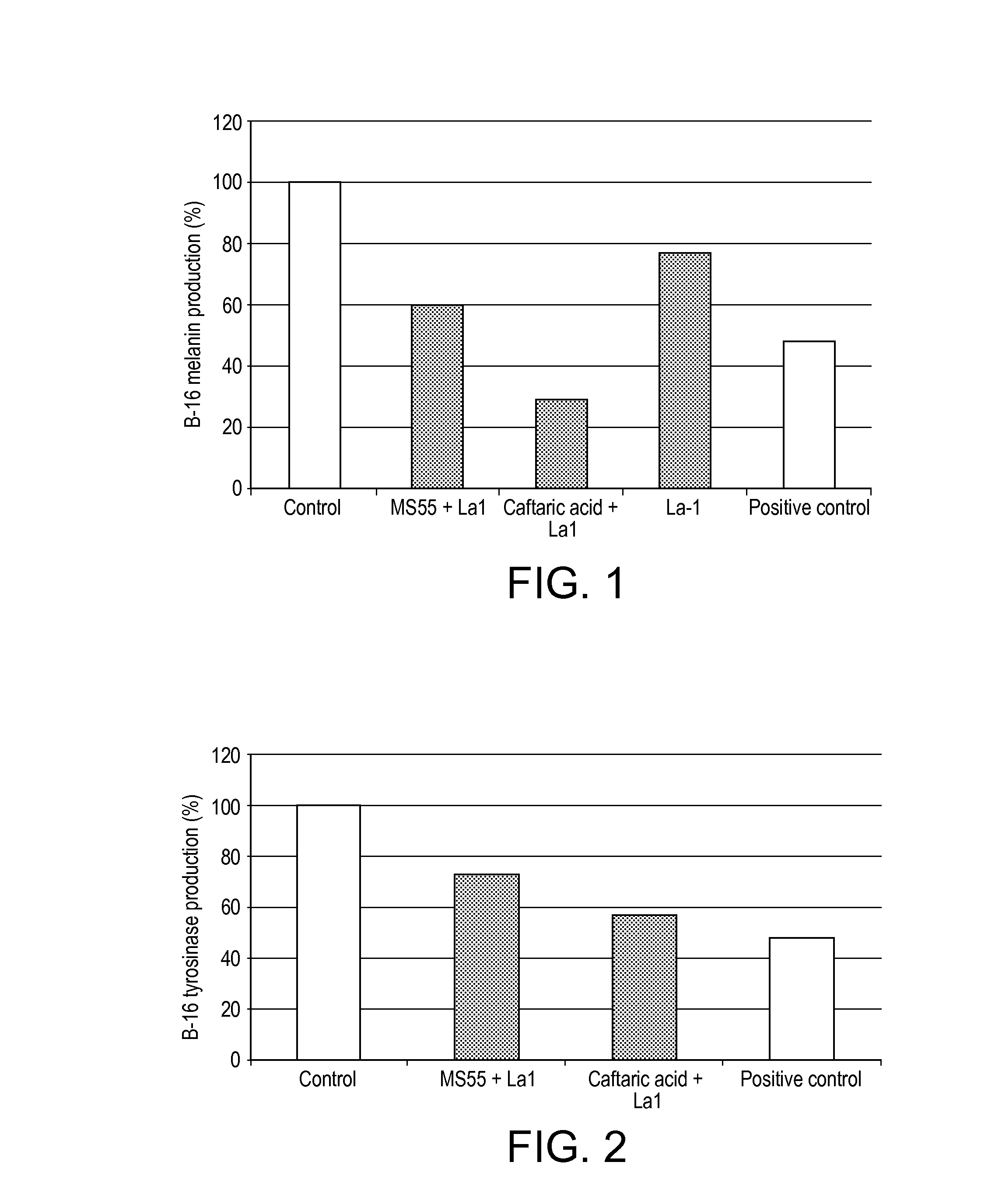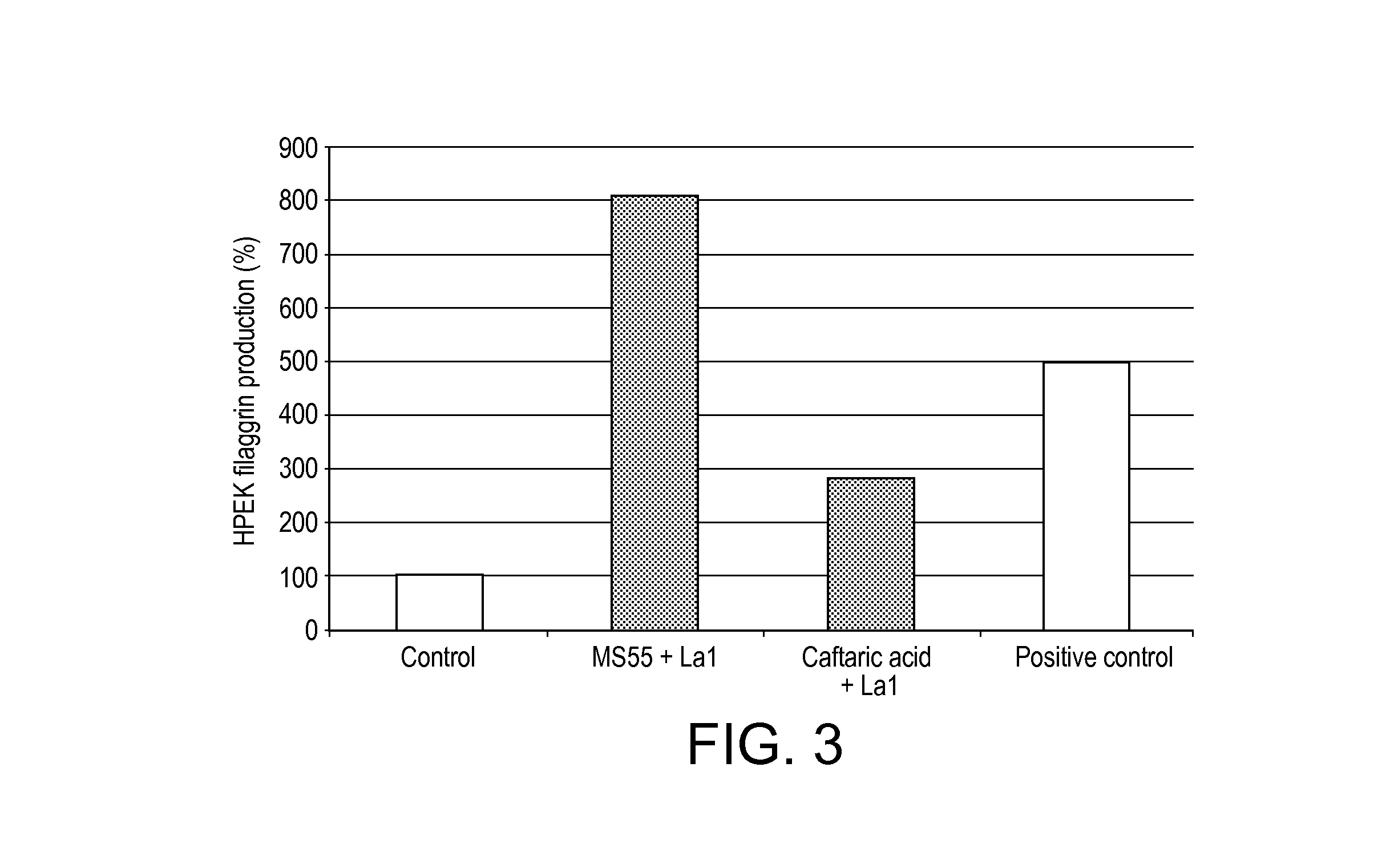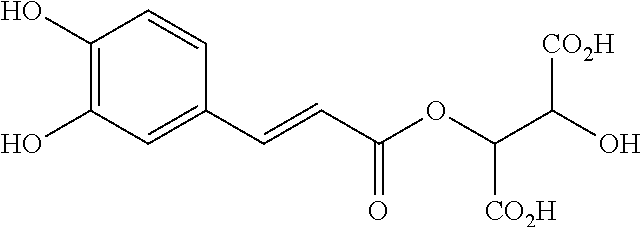Use of caftaric acid and lactic bacterium in food supplement for regulating skin pigmentation
a technology of lactic bacterium and food supplement, which is applied in the direction of bacteria material medical ingredients, biocide, peptide/protein ingredients, etc., can solve the problems of uneven skin tone, sunburn and tanning, and age spots, and achieve rapid and relatively non-restrictive administration mode, the effect of relatively non-restrictive mod
- Summary
- Abstract
- Description
- Claims
- Application Information
AI Technical Summary
Benefits of technology
Problems solved by technology
Method used
Image
Examples
example 1
Hydrolyzis of Caftaric Acid
[0089]1—Hydrolyzis of Caftaric Acid with Chlorogenate Esterase
[0090]A solution of chlorogenate esterase (0.8 mg, 24 U / g, from Kikkoman Japan) in 100 μl phosphate buffer (50 mM, pH 7.0) was added to a solution of caftaric acid (0.57 mg) in 100 μl phosphate buffer (50 mM, pH 7.0). The mixture was then incubated at 37° C. for 4 h. After the reaction time, the enzymatic activity was stopped by heat treatment (5 min, 90° C.) and the mixture was centrifuged (microcon YM10, 30 min, 14000 g). The supernatant was then analysed by HPLC. A control reaction was run in parallel under the same reaction conditions but without enzyme.
[0091]2—Hydrolyzis of Caftaric Acid with L. johnsonii (La1)
[0092]Cells of L. johnsonii (CNCM 1-1225) were grown (7.0 E08 cfu / ml) and centrifuged (5000 g, 10 min), the pellets were resuspended in phosphate buffer (50 mM, pH 7.0) at a concentration of 0.61 g / ml. To 100 μl of this cells solution, 100 μl of a solution of caftaric acid (12 mM) was...
example 2
Effect on Skin Pigmentation
[0111]In order to evaluate the potential beneficial effect of ingredients towards skin de- or pro-pigmentation we used 2D culture of murine melanocytes (B16) and we performed 2 tests: 1—assessment of melanin production and 2—assessment of tyrosinase production.[0112]1. The Cell Culture Conditions.[0113]B16 cells were cultured in DMEM 1 g / L glucose without phenol red supplemented with 10% foetal calf serum, in a humidified chamber at 37° C. and containing 5% CO2.[0114]2. The Production of Melanin by B16 Murine Melanocyte Cell Line.[0115]Cells were incubated with the selected ingredients or the test references (Kojic acid at 400 μg / mL) for 72 hours, in the presence or absence of NDP-MSH an analog of MSH. The total quantity of melanin (extracellular and intracellular) was evaluated by measurement of the optical density at 405 nm of each sample against melanin standards in presence or in absence of NDP-MSH.[0116]3. The Production of Tyrosinase by B16 Murine Me...
example 3
Effect on Skin Barrier Function and Hydration
[0123]The potential beneficial effect of the Extracts of Example 2 towards skin barrier function and skin hydration was evaluated by using 2D culture of human primary epidermal keratinocytes and we assessed their synthesis of filaggrin after treatment with the selected ingredients.
[0124]The Cell Culture Conditions.
[0125]Human epidermal keratinocytes were cultured in control keratinocytes-SFM medium, in a humidified chamber at 37° C. and containing 5% CO2.
[0126]The Synthesis of Filaggrin by Human Epidermal Keratinocytes.
[0127]Cells were incubated with the selected ingredients or the test references (CaCl2 at 1.5 mM) for 144 hours. The production of filaggrin by was evaluated by immunolabeling.
[0128]Results
[0129]The results are shown in FIG. 3. Pre-treatment of the cells with caftaric acid+La1 showed a significant increase of filaggrin (280% of the control, FIG. 3), suggesting that these extracts could strengthen skin barrier. A stronger sk...
PUM
| Property | Measurement | Unit |
|---|---|---|
| pH | aaaaa | aaaaa |
| pore size | aaaaa | aaaaa |
| particle size | aaaaa | aaaaa |
Abstract
Description
Claims
Application Information
 Login to View More
Login to View More - R&D Engineer
- R&D Manager
- IP Professional
- Industry Leading Data Capabilities
- Powerful AI technology
- Patent DNA Extraction
Browse by: Latest US Patents, China's latest patents, Technical Efficacy Thesaurus, Application Domain, Technology Topic, Popular Technical Reports.
© 2024 PatSnap. All rights reserved.Legal|Privacy policy|Modern Slavery Act Transparency Statement|Sitemap|About US| Contact US: help@patsnap.com










